NEWS ROUNDUP
Boeing reboots ● Privatizing our postal service ● Bosses get paid
Monday, December 30, 2019
The Entire Staff of The Stand has been gone for a couple weeks and missed some news. (Apparently, Muilenburg is out and Marshawn is in.) Today and tomorrow we’ll attempt to catch you (and ourselves) up on what we have missed as 2019 winds to a close.
HAPPY NEW YEAR!
TODAY at The Stand — New year brings paid leave, wage increases in Washington
► From KNKX — Washington state workers can now receive paid family and medical leave benefits — Employees in Washington state who qualify will be able to receive up to 12 weeks of paid leave to stay home with a newborn or a foster or adopted child. They’ll also be able to receive paid leave or to care for a spouse, domestic partner or family member with a serious illness. And the law lets workers receive paid time off to be with a family member who’s active duty military and is home from a deployment overseas.
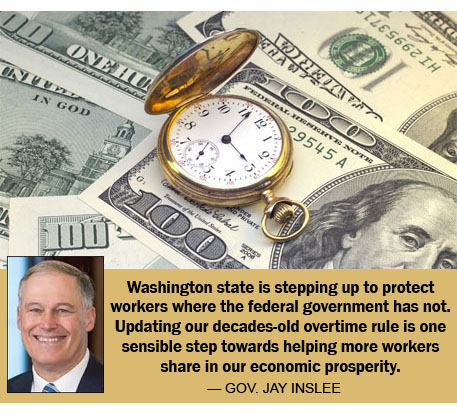 ► In the Boston Globe — On Jan. 1, the OT cap for salary workers rises to $35,568. Mass. wants to raise it even higher — On Jan. 1, the federal threshold at which salaried workers are no longer eligible to earn extra pay will rise from $23,660 to $35,568, or $684 a week, qualifying an estimated 1.3 million more Americans for overtime unless their employers raise their salaries above that limit. That is millions fewer than would have benefited from a higher level proposed by the Obama administration, but in Massachusetts, legislators are looking to raise the limit even higher, to $64,000 by 2024.
► In the Boston Globe — On Jan. 1, the OT cap for salary workers rises to $35,568. Mass. wants to raise it even higher — On Jan. 1, the federal threshold at which salaried workers are no longer eligible to earn extra pay will rise from $23,660 to $35,568, or $684 a week, qualifying an estimated 1.3 million more Americans for overtime unless their employers raise their salaries above that limit. That is millions fewer than would have benefited from a higher level proposed by the Obama administration, but in Massachusetts, legislators are looking to raise the limit even higher, to $64,000 by 2024.
EDITOR’S NOTE — Washington state’s “strongest in the nation” overtime threshold will begin to phase in on July 1, 2020, with an increase to 1.25 times the state minimum wage, roughly matching the federal increase from Jan. 1. But beginning on Jan. 1, 2021, it will surpass the federal threshold and continue to increase each year until reaching 2.5 times the state minimum wage.
► From CNN — 24 states will raise minimum wage in 2020
EDITOR’S NOTE — The Washington state minimum wage rises to $13.50 an hour on Jan. 1.
MORE local coverage of Washington’s minimum wage increase in the (Everett) Herald and the(Spokane) Spokesman-Review.
BOEING
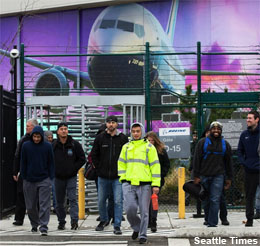 ► In the Seattle Times — Boeing will halt Renton assembly lines for 737 MAX, but no layoffs for employees — Nine months after the Federal Aviation Administration (FAA) grounded the 737 MAX, Boeing finally pulled the plug on the jet’s production on Monday, Dec. 16. The company announced it’s temporarily halting the assembly lines in Renton from January, with no specified timeline for a restart. However, in a welcome surprise for the 12,000-strong Renton workforce, Boeing said there will be no layoffs.
► In the Seattle Times — Boeing will halt Renton assembly lines for 737 MAX, but no layoffs for employees — Nine months after the Federal Aviation Administration (FAA) grounded the 737 MAX, Boeing finally pulled the plug on the jet’s production on Monday, Dec. 16. The company announced it’s temporarily halting the assembly lines in Renton from January, with no specified timeline for a restart. However, in a welcome surprise for the 12,000-strong Renton workforce, Boeing said there will be no layoffs.
► In the Seattle Times — Boeing 737 MAX production halt ripples out as supplier Spirit stops fuselage work, United delays MAX flights until June
ALSO see responses from IAM 751 and SPEEA.
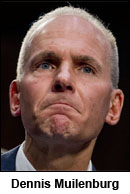 ► From CNN — Boeing’s fired CEO could walk away with a $60 million golden parachute — Boeing’s ousted CEO Dennis Muilenburg left behind a long list of problems at Boeing, but he’s walking away with a sizable golden parachute. The exact amount of money that he will leave with isn’t yet clear. That will depend on his negotiations with Boeing. but public filings show Muilenburg could be entitled to a benefit plan worth more than $30 million and, potentially, a severance payment of about $7 million. Muilenburg also has another $20 million-plus worth of vested stock and a pension package totaling more than $11 million.
► From CNN — Boeing’s fired CEO could walk away with a $60 million golden parachute — Boeing’s ousted CEO Dennis Muilenburg left behind a long list of problems at Boeing, but he’s walking away with a sizable golden parachute. The exact amount of money that he will leave with isn’t yet clear. That will depend on his negotiations with Boeing. but public filings show Muilenburg could be entitled to a benefit plan worth more than $30 million and, potentially, a severance payment of about $7 million. Muilenburg also has another $20 million-plus worth of vested stock and a pension package totaling more than $11 million.
► In the Seattle Times — Lawmakers, analysts welcome Muilenburg’s departure from Boeing as positive step
► In the Seattle Times — Top Boeing attorney who oversaw 737 MAX legal fallout to retire — J. Michael Luttig, 65, who served as counselor and senior adviser to CEO Dennis Muilenburg before the latter was fired Monday by Boeing’s board of directors, will retire.
► In the Seattle Times — Boeing documents sent to House committee called ‘very disturbing’ — Internal documents newly provided by Boeing to a U.S. House committee investigating two fatal crashes of the 737 MAX appear to portray a “very disturbing picture” of safety concerns raised by some employees and efforts by others to evade regulators, a spokeswoman for the committee said Tuesday, Dec. 24.
 ► From Bloomberg — For Boeing’s new CEO, saving the Max is only the first hurdle — Boeing’s incoming boss, David Calhoun, faces a daunting task when he takes over as CEO next year: rescuing the 737 Max while mending the company’s fractured relationship with U.S. regulators. But that’s just the first of the hurdles awaiting him.
► From Bloomberg — For Boeing’s new CEO, saving the Max is only the first hurdle — Boeing’s incoming boss, David Calhoun, faces a daunting task when he takes over as CEO next year: rescuing the 737 Max while mending the company’s fractured relationship with U.S. regulators. But that’s just the first of the hurdles awaiting him.
► In today’s Seattle Times — Boeing’s 737 MAX crisis leaves it badly behind in ‘arms race’ for next decade’s jets — As Boeing’s new leaders struggle to recover control, they face crucial decisions about developing new airplanes while they cope with depleted financial resources, a distracted engineering corps and a loss of Boeing’s previous strategic advantage against rival Airbus. They’ll also face pressure to reverse a two-decadeslong decline in the company’s historic culture of engineering prowess, which many blame for the MAX disaster… Stan Sorscher, a former Boeing and SPEEA analyst, said Boeing won’t succeed at that next new airplane unless its leaders can reassert its legacy engineering standards.
LOCAL
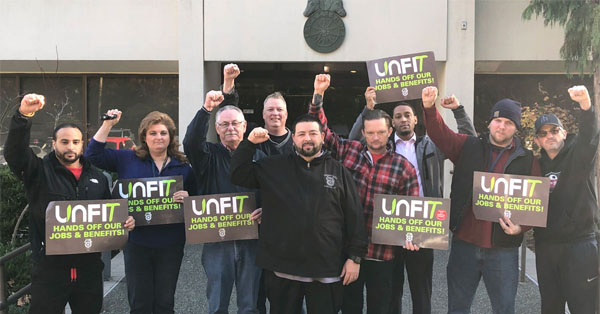
► In the News Tribune — Tacoma grocery distribution workers face uncertain future as executives collect bonuses — 2019 has become a year where laid-off Supervalu/UNFI workers face an uncertain future in their labor fight with the company while UNFI’s CEO and other top executives saw six-figure bonuses approved by the company’s board and shareholders. It’s also been a year that saw more than 100 years of employment history leave Tacoma for a new era in food distribution… UNFI has appealed a labor arbitrator’s decision that ruled in favor of the workers and for UNFI to honor the Tacoma workers’ contracts at the nonunion Centralia site. Says Teamsters Local 117: “We have a legally sound arbitration decision that supports our position that those layoffs are unlawful. If we prevail in the case, and we believe that we will, over 200 of our members will be entitled to a significant back-pay award.”
 ► In the Columbian — Clark College, faculty union still locked in negotiations — Clark College and its faculty union remained locked in negotiations Friday afternoon as the clock ticks down to a potential strike approved by the Association for Higher Education. The association, which represents about 400 full-time and part-time faculty, is advocating for improved salaries in light of a 2018 change to state law allowing faculty unions to bargain for salary increases using local funding. The two sides have been bargaining for more than a year, culminating in union members voting unanimously this month to strike if a deal isn’t reached soon. The union and college scheduled another mediated bargaining session on Jan. 2. Winter quarter will start Jan. 6.
► In the Columbian — Clark College, faculty union still locked in negotiations — Clark College and its faculty union remained locked in negotiations Friday afternoon as the clock ticks down to a potential strike approved by the Association for Higher Education. The association, which represents about 400 full-time and part-time faculty, is advocating for improved salaries in light of a 2018 change to state law allowing faculty unions to bargain for salary increases using local funding. The two sides have been bargaining for more than a year, culminating in union members voting unanimously this month to strike if a deal isn’t reached soon. The union and college scheduled another mediated bargaining session on Jan. 2. Winter quarter will start Jan. 6.
ALSO at The Stand — Clark College faculty union votes to authorize strike (Dec. 9)
► In today’s (Everett) Herald — 2020: Light rail, ferry terminal and possible transit merger — The major transportation stories to track in the coming year involve Everett, Lynnwood and Mukilteo.
THIS WASHINGTON
► In today’s Seattle Times — With the loss of Referendum 88, affirmative-action advocates wonder what’s next. Inslee offers some answers. — In a campaign full of charged politics and emotional arguments over race and equity, the statewide measure lost by 1 point. That made it one of the most closely decided ballot measures in recent times and left affirmative-action advocates weighing how they might still achieve at least some of their goals, even as Washington remains one of just eight states to have outlawed affirmative action. Some Democratic state lawmakers and Gov. Jay Inslee now want to find other ways to improve equity without the affirmative-action measure.
► In today’s Seattle Times — Amid serious violations at Washington’s private psychiatric hospitals, a regulator remained on the sidelines — Over five years, Medicaid and other state payments to five private psychiatric hospitals nearly tripled, totaling almost $67 million in 2018. In more than a dozen inspections since 2016, state and federal regulators found violations at four private psychiatric hospitals that were serious enough to warrant termination from Medicare, though they stopped short of doing so.
THAT WASHINGTON
 ► From Fortune — USPS could privatize as early as next year — The USPS shipped more than 13 billion pieces of mail and packages this holiday season. But now that gift-giving has abated, the agency, which falls under Trump’s jurisdiction, is facing another deadline: find a new Postmaster General by January 2020. The new leadership will be handpicked and approved by the Postal Service’s Board of Governors: a group of five men (mostly with investment banking and private banking experience), three of whom were appointed by Trump, along with the current Postmaster General and her deputy. Once the new leadership is in place, the board will also be tasked by the Trump administration with creating a package of large, structural changes intended to help the ailing Postal Service. Those changes will likely include privatizing and selling pieces of the public service off, according to the APWU, which represents more than 200,000 current and retired postal employees.
► From Fortune — USPS could privatize as early as next year — The USPS shipped more than 13 billion pieces of mail and packages this holiday season. But now that gift-giving has abated, the agency, which falls under Trump’s jurisdiction, is facing another deadline: find a new Postmaster General by January 2020. The new leadership will be handpicked and approved by the Postal Service’s Board of Governors: a group of five men (mostly with investment banking and private banking experience), three of whom were appointed by Trump, along with the current Postmaster General and her deputy. Once the new leadership is in place, the board will also be tasked by the Trump administration with creating a package of large, structural changes intended to help the ailing Postal Service. Those changes will likely include privatizing and selling pieces of the public service off, according to the APWU, which represents more than 200,000 current and retired postal employees.
ALSO at The Stand — Say NO to privatizer as Postmaster General
► In the Amsterdam News — Trump appointed NLRB appointees are making it harder for workers, labor fights back — Several recent decisions by the National Labor Relations Board would make it harder for workers to unionize. However, labor unions refused to take these decisions lying down.
► From HuffPost — The campaign against ‘Medicare For All’ is spending millions. Progressives not so much. — The Partnership for America’s Health Care Future ― an industry front group representing private health insurers, hospitals and pharmaceutical companies ― has spent at least $1 million in television advertisements blasting the policy in Iowa alone. The spending against Medicare for All has not been matched by any progressive outside groups.
NATIONAL
► From Business Insider — The massive GM strike is a perfect example of our political moment and a harbinger of the coming battles between labor and corporations (by Margarida Jorge) — According to Gallup, union approval is at a near 50-year high, with 64% of Americans approving of labor unions. That more than half of the country approves of unions not only signals organized labor’s enduring strength, but also highlights growing public recognition that we need unions today more than ever. The UAW strike of General Motors — one of the most successful union movements of the year — is evidence that workers can leverage increased strength through unions. The successful strike showed many across the country that joining unions and demanding essential benefits like healthcare and higher wages is well worth the fight.
EDITOR’S NOTE — Tired of being disrespected? Get a union! Find out more information about how you can join together with co-workers and negotiate a fair return for your hard work. Or go ahead and contact a union organizer today!
 ► From The Hill — Stock buybacks point AT&T in the wrong direction (by CWA President Chris Shelton and Sen. Tammy Baldwin) — Under pressure from vulture hedge fund manager Paul Singer, the company recently committed to spending 70 percent of its free cash flow – a massive $30 billion – on buying back its own stock to boost share prices. While this worrying trend is becoming more common across corporate America, AT&T’s example is particularly troubling because of its proud tradition of connecting all Americans by providing universal service. AT&T employs more than 200,000 people in communities all across the country, creating and sustaining family-supporting jobs. Using profits to enrich wealthy shareholders and corporate executives through stock buybacks puts that tradition in jeopardy.
► From The Hill — Stock buybacks point AT&T in the wrong direction (by CWA President Chris Shelton and Sen. Tammy Baldwin) — Under pressure from vulture hedge fund manager Paul Singer, the company recently committed to spending 70 percent of its free cash flow – a massive $30 billion – on buying back its own stock to boost share prices. While this worrying trend is becoming more common across corporate America, AT&T’s example is particularly troubling because of its proud tradition of connecting all Americans by providing universal service. AT&T employs more than 200,000 people in communities all across the country, creating and sustaining family-supporting jobs. Using profits to enrich wealthy shareholders and corporate executives through stock buybacks puts that tradition in jeopardy.
TODAY’S MUST-READ
 ► From The Guardian — The biggest business con of 2019: fleecing workers while bosses get rich (by Robert Reich) — Consider Boeing, whose board just fired its CEO, Dennis Muilenburg, in order “to restore confidence in the company moving forward as it works to repair relationships with regulators, customers, and all other stakeholders.” Restore confidence? Muilenburg’s successor will be David Calhoun, who, as a longstanding member of Boeing’s board of directors, allowed Muilenburg to remain CEO for more than a year after the first 737 Max crash and after internal studies found that the jetliner posed an unacceptable risk of accident. It caused the deaths of 346 people. Muilenburg raked in $30 million in 2018. He could walk away from Boeing with another $60 million.
► From The Guardian — The biggest business con of 2019: fleecing workers while bosses get rich (by Robert Reich) — Consider Boeing, whose board just fired its CEO, Dennis Muilenburg, in order “to restore confidence in the company moving forward as it works to repair relationships with regulators, customers, and all other stakeholders.” Restore confidence? Muilenburg’s successor will be David Calhoun, who, as a longstanding member of Boeing’s board of directors, allowed Muilenburg to remain CEO for more than a year after the first 737 Max crash and after internal studies found that the jetliner posed an unacceptable risk of accident. It caused the deaths of 346 people. Muilenburg raked in $30 million in 2018. He could walk away from Boeing with another $60 million.
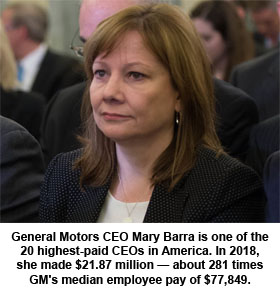 With great fanfare last August, the Business Roundtable announced a “fundamental commitment to all of our stakeholders” (emphasis in the original) and not just their shareholders. The Roundtable’s commitment came in response to growing public distrust of big corporations, and proposals from several Democratic candidates to rein them in. Another Business Roundtable director is Mary Barra, CEO of General Motors. Just weeks after making the commitment, and despite GM’s hefty profits and large tax breaks, Barra rejected workers’ demands that GM raise their wages and stop outsourcing their jobs. Earlier in the year GM shut its giant assembly plant in Lordstown, Ohio. About 50,000 GM workers then staged the longest auto strike in 50 years. They won a few wage gains but didn’t save any jobs. Meanwhile, GM’s stock has performed so well that Barra earned $22 million last year.
With great fanfare last August, the Business Roundtable announced a “fundamental commitment to all of our stakeholders” (emphasis in the original) and not just their shareholders. The Roundtable’s commitment came in response to growing public distrust of big corporations, and proposals from several Democratic candidates to rein them in. Another Business Roundtable director is Mary Barra, CEO of General Motors. Just weeks after making the commitment, and despite GM’s hefty profits and large tax breaks, Barra rejected workers’ demands that GM raise their wages and stop outsourcing their jobs. Earlier in the year GM shut its giant assembly plant in Lordstown, Ohio. About 50,000 GM workers then staged the longest auto strike in 50 years. They won a few wage gains but didn’t save any jobs. Meanwhile, GM’s stock has performed so well that Barra earned $22 million last year.
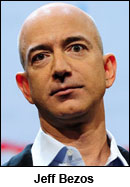 Jeff Bezos, CEO of Amazon, is another member of the Business Roundtable. Just weeks after he made the commitment to all his stakeholders, Whole Foods, an Amazon subsidiary, announced it would be cutting medical benefits for its entire part-time workforce. The annual saving to Amazon from this cost-cutting move is roughly what Bezos — whose net worth is $110 billion — makes in two hours.
Jeff Bezos, CEO of Amazon, is another member of the Business Roundtable. Just weeks after he made the commitment to all his stakeholders, Whole Foods, an Amazon subsidiary, announced it would be cutting medical benefits for its entire part-time workforce. The annual saving to Amazon from this cost-cutting move is roughly what Bezos — whose net worth is $110 billion — makes in two hours.
The truth is, American corporations are sacrificing workers and communities as never before, in order to further boost record profits and unprecedented CEO pay. The only way to make corporations socially responsible is through laws requiring them to be. The only way to get such laws enacted is by reducing corporate power and getting big money out of politics. The first step is to see corporate social responsibility for the con it is.
The Stand posts links to Washington state and national news of interest every weekday morning by 10 a.m.







